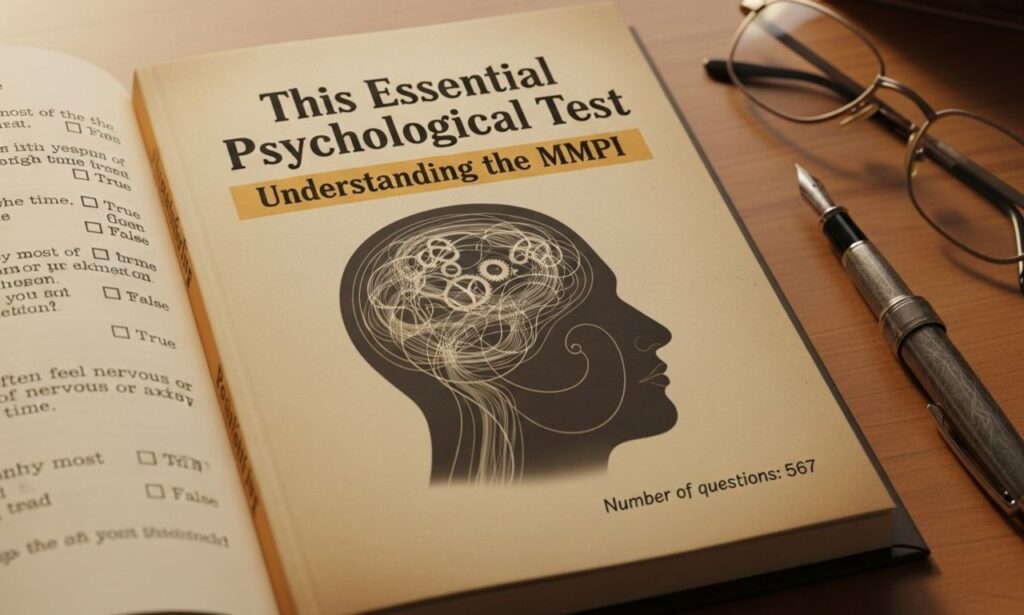The Minnesota Multiphasic Personality Inventory, or MMPI, is a powerful tool in the realm of psychological assessment. It’s often seen as the gold standard for understanding personality traits and mental health conditions. But what exactly goes into this test? If you’ve ever wondered how many questions are on the MMPI, you’re not alone. This essential psychological inventory dives deep into an individual’s psyche through a series of carefully crafted queries designed to reveal both normal and abnormal behavior patterns.
As we explore this fascinating subject, you’ll discover not just the number of questions involved but also why they matter in assessing personality. Whether you’re considering taking the test yourself or simply curious about its impact, knowing more about the MMPI can offer invaluable insights into human psychology and behavior. Let’s embark on this journey together!
What is How many questions on mmpi?
The MMPI, or Minnesota Multiphasic Personality Inventory, is a widely used psychological assessment tool. It helps clinicians understand an individual’s personality structure and detect potential psychopathologies.
When people ask, “how many questions on MMPI?” they are curious about its depth and complexity. The standard version contains 567 items that gauge various aspects of mental health and personality traits.
Each question is designed to elicit specific responses, revealing insights into the test-taker’s emotional state, behavior patterns, and interpersonal relationships. Respondents answer true or false to each statement.
This extensive question set allows for a comprehensive evaluation while also ensuring reliability in results. The sheer number of items enhances the accuracy of the findings by providing a broad spectrum of data for analysis.
History and Purpose of the MMPI
The Minnesota Multiphasic Personality Inventory (MMPI) was developed in the late 1930s by psychologists Starke R. Hathaway and J.
C. McKinley at the University of Minnesota. Their goal was to create a robust tool for assessing mental health conditions.
Initially designed for identifying psychiatric disorders, the MMPI quickly gained traction among clinicians seeking reliable data on personality traits and psychopathology. Its emphasis on empirical research set it apart from other psychological assessments of its time.
Over decades, this test evolved through revisions, with MMPI-2 released in 1989 and MMPI-2-RF in 2008, refining its accuracy and relevance.
Today, it serves not only clinical purposes but also aids in employment screenings, legal cases, and various therapeutic settings. The enduring legacy of the MMPI lies in its ability to provide insights into human behavior across diverse contexts.
How Many Questions are on the MMPI?
The Minnesota Multiphasic Personality Inventory, or MMPI, is a comprehensive psychological assessment widely used in mental health settings. One of the most common questions people ask is about its length.
Typically, the standard MMPI-2 version contains 567 items. These items include true/false statements that aim to uncover various aspects of an individual’s personality and psychopathology.
There’s also a shorter version called the MMPI-2-RF, which consists of 338 items. This streamlined format still provides valuable insights while making the testing process more efficient.
Each question serves a specific purpose, contributing to an accurate portrayal of psychological well-being. The sheer volume may seem daunting at first glance but reflects the test’s depth and reliability in assessing complex human behaviors.
Types of Questions on the MMPI
The MMPI consists of a variety of question types designed to assess different aspects of personality and psychological functioning. Respondents encounter true-false statements, which gauge their agreement or disagreement with specific assertions.
There are also multiple-choice questions that present various scenarios. These allow for nuanced responses, reflecting the complexity of human emotions and behaviors.
Some items focus on feelings and thoughts, while others address social interactions or past experiences. This diversity helps paint a comprehensive picture of an individual’s mental landscape.
Additionally, there are validity scales embedded in the test to detect inconsistencies or attempts at manipulation. This ensures that results remain reliable and accurate throughout the assessment process.
These varied types encourage honest self-reflection while uncovering underlying patterns within one’s personality.
Scoring and Interpretation of Results
Scoring the MMPI involves a comprehensive approach to understanding personality traits and psychological conditions. Each response contributes to various scales that measure different aspects of mental health.
Results are presented in several profiles, indicating areas of concern or strength. T-scores help interpret these results, with higher scores often suggesting significant issues.
Clinicians analyze patterns rather than focusing solely on individual items. This nuanced interpretation allows for a deeper insight into an individual’s psychological state.
Certain scale elevations can indicate specific disorders, but context is key. Factors such as demographics and personal history also play crucial roles in analysis.
The final report offers valuable perspectives for both clients and therapists, fostering open discussions about mental well-being. Understanding this process is essential for utilizing the MMPI effectively in therapeutic settings.
Benefits of Taking the MMPI
Taking the MMPI can provide profound insights into your personality and emotional well-being. For individuals seeking self-awareness, it serves as a valuable tool to uncover hidden aspects of their psyche.
The results help identify strengths and weaknesses, allowing for personal growth. Understanding your traits can enhance relationships, both personal and professional.
Mental health professionals often use the MMPI to tailor treatment plans. It aids in diagnosing psychological conditions more accurately. This allows for targeted interventions that are crucial for effective therapy.
Moreover, employers sometimes utilize the MMPI during hiring processes. Knowing an applicant’s personality profile helps ensure they fit within company culture.
Engaging with this test encourages open conversations about mental health. It normalizes discussions around emotions and behaviors that many might otherwise avoid addressing directly.
The Importance of Psychological Testing and Understanding Your Personality
Psychological testing plays a crucial role in understanding ourselves. It provides insights into our behaviors, emotions, and thought patterns.
Understanding your personality can enhance personal growth. It helps identify strengths and weaknesses that may impact relationships or career choices.
Tests like the MMPI offer a structured way to explore these dimensions. They reveal aspects of our psyche we might overlook or misunderstand.
Moreover, knowing your personality traits can improve communication skills. This knowledge fosters empathy towards others by highlighting differences in perspectives.
In therapeutic settings, psychological assessments guide treatment plans tailored to individual needs. They create pathways for deeper self-awareness and emotional healing.
Embracing psychological testing empowers us to navigate life more effectively. Each insight gained is a step toward greater fulfillment and connection with ourselves and those around us.
Conclusion
How many questions on mmpi, or Minnesota Multiphasic Personality Inventory, stands as a pivotal tool in the realm of psychological evaluation. With its rich history and well-structured purpose, it serves not just to assess personality traits but also to aid in diagnosing mental health conditions.
Understanding how many questions on the MMPI is vital for those considering taking this assessment. It consists of 567 items designed to probe various aspects of an individual’s psyche. This extensive range ensures that the test captures a comprehensive picture of one’s personality.
The types of questions vary significantly; they encompass true/false statements covering emotions, behaviors, thoughts, and even relationships. Each question plays a crucial role in crafting an accurate personality profile.
Scoring on the MMPI can be complex but ultimately offers valuable insights into one’s psychological state. Mental health professionals utilize these scores to interpret results meaningfully.
Taking the MMPI has several benefits—from enhancing self-awareness to assisting therapists in formulating treatment plans tailored specifically for you. Psychological testing like this provides essential clarity about our personalities and behavioral patterns.






